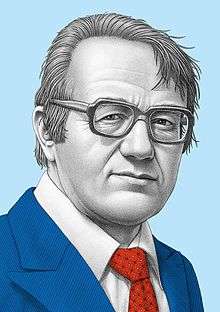Ales Adamovich
Ales Adamovich (Belarusian: Алесь Адамовіч, Alieś Adamovič, Russian: Алесь Адамович, 3 September 1927 in Hluša Minsk Voblast, Belarus, USSR – 26 January 1994 in Moscow, Russia) was a Belarusian Soviet writer and a critic, Professor and Corresponding Member of the Academy of Sciences of Belarus, Doctor of Philosophy in philology, Doctorate in 1962 (a degree in Russia corresponding to Habilitation); member of the Supreme Soviet (1989–92). He wrote in Russian and Belarusian.
Ales Adamovich Алесь Адамовіч | |
|---|---|
 | |
| Born | 3 September 1927 Hlusha, Minsk Voblast, Belarus |
| Died | 26 January 1994 Moscow, Russia |
| Occupation | Writer and critic |
| Nationality | Belarusian |
He is best known for The Khatyn Story, The Blockade Book and writing screenplay for Soviet movie Come and See. He is highly regarded for his austere yet deeply humane antiwar stance, moral courage and uncompromising honesty.
Biography
Ales Adamovich was born Aliaksandar Mikhailavich Adamovich on 3 September 1927 at a village in the Minsk Oblast. Both his parents were doctors.[1] During World War II Adamovich, a teenager, still a school student, became a partisan unit member in 1942-1943. During this time, the Nazis systematically torched hundreds of Belarusian villages and exterminated their inhabitants. Later, he wrote one of his most recognized works, The Khatyn Story, and the screenplay for the film Come and See, which was based on his real-life experiences as a messenger and a guerilla fighter during the war.
Starting in 1944, he resumed his education. After the war, he entered the Belarusian State University where he studied in the philology department and where he completed graduate course; he later studied in Moscow at the Higher Courses for Screenwriters and in the Moscow State University. Starting in the 1950s in Minsk, he worked in the field of philology and literary criticism; later also in cinematography. Was a member of the Union of Soviet Writers since 1957. In 1976 was awarded the Yakub Kolas Belarus State prize in literature for The Khatyn Story. He lived and worked in Moscow since 1986 and was an active member of the Belarusian community of that city.
After the Chernobyl accident in 1986, of which Belarus has suffered more than any other country, Adamovich started actively raising awareness of the catastrophe among the Soviet ruling elite.[2][3]

In late 1980s Ales Adamovich supported the creation of the Belarusian Popular Front but did not become a member of the movement. In 1989 Adamovich became one of the first members of the Belarusian PEN center (Vasil Bykaŭ was founder and president of the Belarusian PEN). In 1994 the Belarusian PEN Center instituted the Ales Adamovich Literary Prize, a literary award to the gifted writers and journalists. The prize is awarded annually on 3 September (Ales Adamovich's birthday) at the award ceremony that is usually part of the annual international conference.
In October 1993, he signed the Letter of Forty-Two.[4] Adamovich died on 26 January 1994.
Ales Adamovich's writings received translation into over 20 languages. Svetlana Alexievich, the Belarusian winner of the Nobel Prize in Literature 2015, names Adamovich as "her main teacher, who helped her to find a path of her own".[5]
Honours and awards
- Order of the Patriotic War 2nd class
- Order of the Red Banner of Labour
- Order of the Badge of Honour
- Medal "Partisan of the Patriotic War" 2nd class
- Medal "For the Victory over Germany in the Great Patriotic War 1941–1945"
In 1997 Ales Adamovich was recognized (posthumously) with the "Honor and Dignity of Talent" award (“За честь и достоинство таланта”). Recipients of this noble award include Dmitry Likhachev, Victor Astafiev, Chingiz Aitmatov, Vasil Bykaŭ, Fazil Iskander, Boris Slutsky, Bulat Okudzhava.
Selected works
- Novels and stories
- The Partisans (in Russian, "Партизаны"), a novel (1960–63) and a film under same name.
- The Khatyn Story, in Russian, "Хатынская повесть", published in 1972, in Belarusian, "Хатынская аповесць", published in 1976; English translation Khatyn published by Glagoslav, 2012; originally written in Belarusian.[6]
- Out of the Fire ("Я з вогненнай вёскі"), Adamovich, Ales, and Yanka Bryl and Uladzimir Kalesnik, 1977; English translation, Progress Publishers, Moscow, 1980.
- Chasteners ("Каратели"), 1980.
- The Blockade Book ("Блокадная книга"), in collaboration with Daniil Granin, 1977–81, written in Russian and later translated into Belarusian; in English translation: Peak Independent Publishers, Moscow, 2003.
- Criticism
- Problems with the New Way of Thinking, Ales Adamovich' "sometimes controversial writing has been at the cutting edge of new thinking in the Soviet Union."
- Screenplay
- Voyna pod kryshami, 1967
- Come and See, in collaboration with Elem Klimov (Иди и смотри, 1985).
- Franz + Polina, 2006
- Chitaem 'Blokadnuyu knigu', 2009
References
- Vronskaya, Jeanne (January 29, 1994). "Obituary: Ales damovich". Independent.
- В блог. "21.by - Новости Беларуси. Последние новости Беларуси из разных источников. Последние новости мира". News.21.by. Retrieved October 29, 2012.
- Сяргей Навумчык. "Як БНФ дамогся праўды пра Чарнобыль". Svaboda.org. Retrieved October 29, 2012.
- Писатели требуют от правительства решительных действий. Izvestia (in Russian). October 5, 1993. Archived from the original on July 16, 2011. Retrieved August 21, 2011.
- Svetlana Alexievich: Voices from Big Utopia
- Timothy Snyder, Literary acts of memory, Times Literary Supplement, 17 July 2013, p. 10.
External links
- Ales Adamovich biography (in Belarusian)
- Selected Literatures and Authors Page - Belarusian Literature, page for Ales Adamovich
- The Ales Adamovich Literary Prize, Belarusian PEN-center
- Ales Mikhailovich Adamovich, bio- and bibliography (in Russian)
- The 2004 Lettre Ulysses Award for the Art of Reportage nomination for "The Blockade Book"